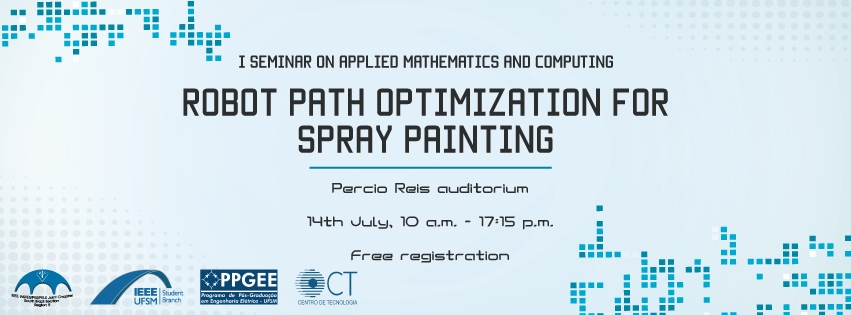| Time |
Activity |
10:00
|
Opening Ceremony |
10:30
|
Invited Speaker: Dr Stefan Jacobsson |
12:00
|
Lunch |
14:00
|
Panel Presentations |
14:45
|
Coffee Break |
15:15
|
Panel Discussion |
| 17:15 |
Closing |
Invited Speaker
Short CV of Dr. Stefan Jakobsson: Stefan Jakobsson has a PhD in Mathematics from Lund University. He has worked as researcher at the Fraunhofer-Chalmers Center for Industrial Mathematics, FCC, Gothenburg, Sweden, since 2006. His project work has been in the applied research areas of computational electromagnetics, finite elements, simulation based optimization and mathematical modelling.
Title: Robot path optimization for spray painting
Abstract: The aim for robot path optimization for spray painting is to minimize the deviation from the desired paint thickness and at the same time keep the cycle time, paint waste and smoothness of the path at acceptable levels. This is a demanding problem in many aspects. First it contains a large number of parameters. The path for painting the hood of a car may contain several hundred of time stamped points (position and orientation). Second the process itself is complex. To simulate the spray painting with electrostatic rotary bells one needs to solve a multi-physics problem involving air flow, electrostatics coupled with a spray of charged paint droplets.
Panel Discussion
Panel Title: Strategic R&D areas for establishing and strengthening partnership between Fraunhofer-Chalmers institute and research groups at UFSM
Chair: Prof. Renato Machado
Invited Panelists
Name: Prof. Daniel Fernando Tello Gamarra, Ph.D (UFSM)
Title: Fuzzy Trajectory Tracking Controller for Differential Drive Robot
Abstract: This study introduces a simple fuzzy trajectory tracking controller for differential drive robots. The choice of the inputs and outputs for the fuzzy controller is one of its main features. The output variables are linear and angular velocities of the robot, commonly used in commercial robots. The inputs are the distance and the angle between the robot and the desired position, information that can be easily obtained. The proposed controller was implemented in a simulation environment and in the DaNI 2.0 mobile robot. The simulation and experimental results are depicted, demonstrating the controller efficiency.
Short bio: He receive the bachelor degree in Engenharia Mecánica from Universidad Nacional Del Centro Del Perú (1998), master degree in Electric Engineering from Universidade Federal do Espírito Santo (2004), master degree in Informatics from University of Sussex (2007) and doctorate in Informatica from Scuola Superiore Sant’Anna di Studi Universitari e Perfezionamento (2009). He has experience in image processing, neural networks, robot kinematics and image based visual servoing.
Name: Eng. Vinícius Ludwig Barbosa, Ph.D student (Blekinge Institute of Technology)
Title: Particle Swarm method applied on beamforming optimization of a switched-beam system
Abstract: This work presents a four-element linear array composed of E-shaped microstrip antennas designed to switched-beam application in ISM (Industrial, Scientific and Medical) radio band. Particle Swarm Optimization (PSO) algorithm is applied to optimize four sets of excitation coefficients in order to achieve different radiation patterns. The solutions must control the main lobe direction and sidelobe level. In this application, the optimization requirements are reached when some constraints are assumed on the algorithm implementation.
Short bio: He received the B.Sc. in Electrical Engineering from Universidade Federal de Santa Maria (UFSM), Santa Maria, Brazil, in 2013. Between 2012 and 2016, he has joined the Signal Processing and Communications Research Group (GPSCom) at UFSM and currently is a Ph.D student at BTH (Blekinge Tekniska Högskola) in Sweden. His research interests are beamforming optimization methods, antennas & propagation, digital beamforming, GNSS systems, and radio occultation.

